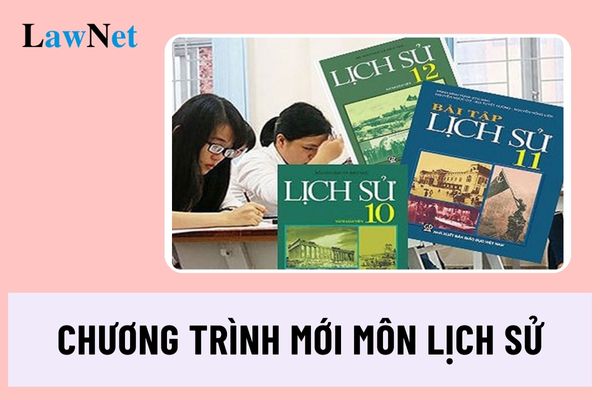Which grade level do students in Vietnam study History according to the new curriculum?
Which grade level do students in Vietnam study History according to the new curriculum?
According to the provisions of Article 2 Circular 32/2018/TT-BGDDT:
The general education curriculum is implemented according to the following schedule:
1. From the school year 2020-2021 for grade 1.
2. From the school year 2021-2022 for grades 2 and 6.
3. From the school year 2022-2023 for grades 3, 7, and 10.
4. From the school year 2023-2024 for grades 4, 8, and 11.
5. From the school year 2024-2025 for grades 5, 9, and 12.
According to Section 4 of the General Education Program issued together with Circular 32/2018/TT-BGDDT, (amended by Article 1 Circular 13/2022/TT-BGDDT) on educational plans:
EDUCATION PLAN
The general education program is divided into two phases: the basic education phase (from grade 1 to grade 9) and the vocational-oriented education phase (from grade 10 to grade 12).
The system of subjects and educational activities of the general education program includes compulsory subjects and educational activities, optional subjects according to vocational orientation (referred to as elective subjects) and optional subjects.
The actual study time in a school year lasts 35 weeks. Educational institutions can organize one-session/day or two-sessions/day teaching. Both one-session/day and two-sessions/day teaching institutions must implement the unified compulsory education content for all schools nationwide.
...
2. Vocational-oriented education phase
2.1. Education content
Compulsory subjects and educational activities: Literature; Mathematics; Foreign Language 1; History; Physical Education; National Defense and Security Education; Experience and Vocational Guidance Activities; Local educational content.
Elective subjects: Geography, Economic and Legal Education, Physics, Chemistry, Biology, Technology, Informatics, Music, Fine Arts.
Students choose 4 elective subjects.
...
The new history curriculum will apply to students in grades 10, 11, and 12 from the school year 2024-2025.

Which grade level do students in Vietnam study History according to the new curriculum? (Image from the Internet)
What are the characteristics of the new History curriculum in Vietnam?
According to Section 1 of the General Education Program for History issued together with Circular 32/2018/TT-BGDDT (download), the new History curriculum has the following characteristics:
- History is a subject that is part of the Social Sciences group, chosen according to vocational orientation at the high school level.
- The History subject aims to help students develop history competence, a component of scientific competence while contributing to forming and developing the key qualities and general capabilities identified in the general program.
- The History subject plays a leading role in educating patriotism, national pride, historical and cultural traditions of the nation, helping students understand and apply historical lessons to solve real-life issues, develop vision, consolidate human values, community spirit, tolerance, and compassion; contribute towards forming and developing the qualities of Vietnamese citizens, global citizens in the context of the evolving era.
- The History subject develops historical thinking, systematic thinking, critical thinking skills, the ability to exploit and use historical sources, understand and present history in chronological and synchronic logic, connecting the past with the present.
- The History subject helps students recognize the scientific and practical value of historiography in modern society, develop an understanding and love for history, culture of the nation and humanity; guide students in career choices such as: social sciences and humanities research, diplomacy, management, tourism activities, cultural industries, information and communication, etc.
- The History program systematizes and consolidates general historical knowledge in the basic education phase while helping students further explore core historical knowledge through study topics and specialized subjects on world history, Southeast Asian history, and Vietnamese history.
The teaching method for the History subject is based on fundamental principles of historiography and modern educational methods.
What is the process of compiling new History textbooks in vietnam?
The process of compiling History textbooks is regulated in Article 9, Standards, and Procedures for compiling, editing textbooks; standards for organizations and individuals compiling textbooks; organization and operation of the National Evaluation Council for textbooks issued together with Circular 33/2017/TT-BGDDT (amended and supplemented by clause 2, Article 1 Circular 05/2022/TT-BGDDT) as follows:
Step 1: Organizations and individuals compiling textbooks select authors who meet the standards specified in Article 11 Circular 33/2017/TT-BGDDT; authors study the general education program issued by the Minister of Education and Training to develop an overall outline, detailed outline, compilation plan; assign duties to the chief author, author (if the book has a chief author, author), ensuring compatibility in the volume of work and time to ensure the quality and progress of completing the textbook sample;
Step 2: Organizations and individuals compiling textbooks organize the compilation, editing, design, illustration, complete at least one (1) lesson, conduct experimental teaching, collect feedback after experimental teaching to perfect that lesson with the participation and consensus of all authors before organizing the compilation of other lessons;
Organize compilation, editing, design, illustration, experimental teaching, collect feedback from teachers, educational managers, scientists, educators knowledgeable about general education to review and evaluate the textbook sample according to the content of each clause specified in Articles 4, 5, 6, 7, and 8 of Circular 33/2017/TT-BGDDT; complete the textbook sample and send it to the Ministry of Education and Training for evaluation;
Step 3: The Ministry of Education and Training organizes the evaluation of the textbook sample according to the regulations in Chapter 4 Circular 33/2017/TT-BGDDT;
Step 4: Organizations and individuals compiling textbooks complete the textbook sample after evaluation;
Step 5: The Minister of Education and Training approves, authorizes the use of textbooks;
Step 6: Organizations and individuals compiling textbooks organize the publication and distribution of textbooks according to legal regulations.

